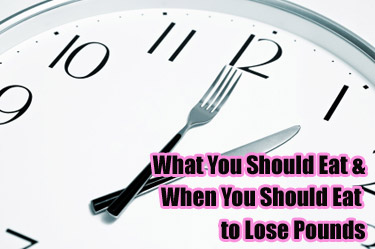 The body has a rhythm to its metabolism that is circadian, that means it follows the daylight cycle. Your metabolism doesn’t just turn on to a set speed when you eat or exercise. Depending on what time of day it is the metabolism will act slower or faster naturally (for most people, that is. Health issues can affect this cycle). This is why learning what to eat and when you should eat it to get the most from your diet is essential. As science discovers more about how our bodies work, you will be surprised to find out that some age old advice about when to eat has always been right, and there are some new findings that may turn the typical diet advice on its head. It is important to remember that your body is also going to adjust to your cycle, so you may have a different metabolic rhythm if you work nights than someone who works days and that needs to be considered when structuring you eating times.
The body has a rhythm to its metabolism that is circadian, that means it follows the daylight cycle. Your metabolism doesn’t just turn on to a set speed when you eat or exercise. Depending on what time of day it is the metabolism will act slower or faster naturally (for most people, that is. Health issues can affect this cycle). This is why learning what to eat and when you should eat it to get the most from your diet is essential. As science discovers more about how our bodies work, you will be surprised to find out that some age old advice about when to eat has always been right, and there are some new findings that may turn the typical diet advice on its head. It is important to remember that your body is also going to adjust to your cycle, so you may have a different metabolic rhythm if you work nights than someone who works days and that needs to be considered when structuring you eating times.
How many times should you eat and what should be on your plate?
Most medical doctors, nutritionists and scientists are in agreement that you are better off eating six small meals a day rather than the traditional three. You should, however, make two of those meals slightly larger than the others to maximize your metabolism. Breakfast remains the single most important meal of the day, but lunch has also proven to be important. Of all of your meals, the lunch meal should be the largest. The rest of your meal times should be much smaller, especially your final meal before sleeping. Eating this frequently provides your body with a constant food source to prevent it going into starvation mode where it will hoard fat for fear of hunger and let you get your maximum nutrition when your body’s metabolism is at its speediest (during the day when you are burning calories and moving).
Recommended times for eating lots of carbs, protein, fats, drinking water,
One surprising essential for all meals is fiber and protein. Every meal you eat, no matter what the size or time, should be balanced more towards the inclusion of fruits and proteins. When to eat your carbs and fats, which are both essential for proper body function, is a bit trickier. More of your carbs should be taken in during breakfast and more fats during lunch. Make sure the carbs you are eating for breakfast don’t come loaded with things you don’t want, such as sugary pastries and donuts. Make sure the fats you eat are good fats, such as the Omega 3s. This means yes to the oatmeal at breakfast and yes to fish at lunch, which can also provide you with protein as well. Don’t make the common mistake of “carb loading” before or after a workout. A reasonable portion of healthy carbs will give you a good energy source for your workout but you want your body to use the existing fat it already has stored during the workout to give it a constant and controlled supply of energy to promote weight loss. All meals should include water and water should also be consumed in-between meals. Drinking water 20 to 40 min before you eat to help you feel full and make sure you don’t confuse the feeling of being thirsty with being hungry.
Eating late
Eating late is both recommended and to be avoided. You should be eating a light meal an 2 hours or so before bed that does include some carbs, but not so much fat or protein. Carbohydrates digestion aids sleep, and it will also serve to make you feel slightly fuller in the morning to prevent overeating at breakfast. Don’t load up on a huge plate of pasta though because your metabolism is much slower when you sleep and you will be more apt to store fat than to use the carbs as fuel at night.

Comment Via Facebook